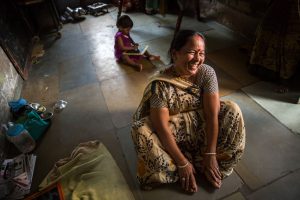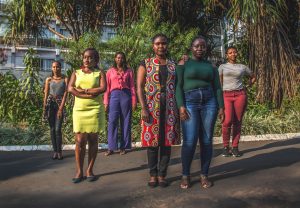Help us protect the commons. Make a tax deductible gift to fund our work. Donate today!
Storytelling is a powerful tool because it can change perceptions and inspire action—and images are an essential component. As Depression-era American photojournalist and documentarian Dorothea Lange said, “The camera is an instrument that teaches people how to see without a camera.”
Unfortunately, finding high-quality and diverse openly licensed images, particularly those of women, is a difficult task for activists and nonprofit organizations. Either they don’t exist or they’re behind expensive paywalls. Thankfully, the William and Flora Hewlett Foundation—one of Creative Commons’ institutional supporters—is making that task easier with Images of Empowerment, a CC-licensed stock photography collection that shares women’s stories from across the world.
Opening access to women’s stories through Images of Empowerment

“Jyotsna Mahendra” by Paul Bronstein (2015), CC BY-NC. Jyotsna Mahendra is a teacher at BALSEWA Daycare. The BALSEWA Center, run by the Self Employed Women’s Association (SEWA), holistically addresses the issues of women working in the informal sector by providing affordable daycare, health check-ups, and educational programs.
In 2015, the Hewlett Foundation approached Getty Images to “tell the important story of women’s lives in sub-Saharan Africa through powerful, positive images.” According to Sarah Jane Staats, communications manager for the Hewlett Foundation’s Global Development and Population Program, the Foundation recognized that “…too often the images most available to us in commercial stock photography collections or in the media focus on disaster, poverty, or reinforce outdated gender stereotypes.”
“Nonprofits around the world can access powerful, positive images to help tell the story of their work and why it matters.”
The Foundation decided to publish the images under a Creative Commons Attribution-NonCommercial (CC BY-NC 4.0) license so that “nonprofits around the world can access powerful, positive images to help tell the story of their work and why it matters.” This decision was in line with the Foundation’s open licensing policy, and its support of CC’s open licensing and open education work for over a decade.
By 2017, the Women in Informal Employment: Globalizing and Organizing (WIEGO) added photographs from Colombia, Ghana, India, Peru, South Africa, and Thailand showcasing women’s “informal work” (e.g. cleaning homes, collecting recyclables, etc.). In 2018, the David and Lucile Packard Foundation became a collaborator as well, adding photographs from Bihar, India and from Louisiana and Mississippi in the United States. This year, they added a new collection from Rwanda.

“Chanda Burks” by Nina Robinson (2018), CC BY-NC. Chanda Burks with her two sons. Chanda is a youth program specialist with Total Community Action, Inc. (TCA), a non-profit community-based agency dedicated to serving the needs of the disadvantaged. TCA partners with the Louisiana Public Health Institute (LPHI) to provide reproductive health education to the youth of the community.
According to Emily Bosworth, communications manager at the David and Lucile Packard Foundation, these images could have a profound impact on gender inequality and bias. “The photos we use to tell stories matter. Images quickly connect to our emotions and leave a lasting impression,” Bosworth explained, “Affordable, easy access to high-quality images that accurately portray women and girls as they are—in decision-making roles, as active participants in their communities—has tremendous power in challenging gender stereotypes and reinforcing asset-based narratives.”
“The photos we use to tell stories matter. Images quickly connect to our emotions and leave a lasting impression.”
Today, the Images of Empowerment collection includes over 2,000 images licensed CC BY-NC 4.0 from across Colombia, Ghana, India, Kenya, Peru, Rwanda, Senegal, South Africa, Thailand, Uganda, and the United States. The images in the collection show women as “active participants in their communities, accessing and providing quality reproductive health information and services, and advocating for better working conditions.”
Now you can search these images more easily through the Images of Empowerment website
Just in time for International Women’s Day (IWD) on March 8, the Hewlett Foundation and the Packard Foundation launched a dedicated stock photography website for the Images of Empowerment collection.
Users can now easily search and download these images for use in their nonprofit work, as well as learn more about each photo thanks to the detailed captions that identify the individuals in the pictures and provide additional context. Incredibly, they’ve also included accompanying videos for each collection that share the experiences of the photographers involved.

“Medical Students for Choice” by Yagazie Emezi (2019), CC BY-NC. Medical Students for Choice (MSFC) leaders from Uganda, Burundi, Rwanda, and Tanzania pose for a portrait after the second regional MSFC conference. Medical students and practitioners from ten African countries gathered at the convening, where they learned best practices around contraceptive use and safe abortion.
Images from the collection have been used by nonprofits across the world for conference materials, research and policy briefs, social media content, and more. Media organizations have also utilized the images, including The New York Times, Vox, Time, and the Guardian to explain the impact of certain policy issues (e.g. reproductive health).
Bosworth noted that the images from Bihar, India (photographed by Paula Bronstein) have made a noticeable impact. “By capturing the strength and resilience of women and girls in Bihar,” she wrote, “the images challenge false stereotypes about the role of women and deliver a more accurate message about the remarkable individuals that call this region home.”
Explore the Images of Empowerment collection!
We believe this collection demonstrates how open access can help create a more equitable, accessible, and innovative world through sharing. Please consider donating to Creative Commons so that we can continue stewarding the CC licenses and building the open access tools and platforms individuals and organizations, like the Hewlett Foundation, use to share.
Posted 10 March 2020